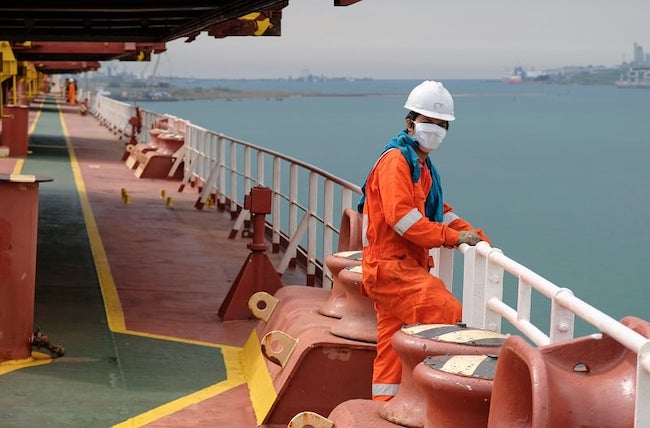

Coronavirus – Issues and effects in relation to laytime and demurrage

As China grapples with the growing tragedy brought upon them by the coronavirus, the shipping industry and container operators in particular, are already feeling the down-turn in business caused by the shutting of major manufacturing plants. In procedures that were seen around the time of the Ebola outbreak, ports and many countries are issuing strict protocols making it mandatory to make declarations on the health of crew on board where vessels have called in China either within a certain period (typically 30 days) or within the past five ports[1]. The risks involve quarantine measures, closure of ports, possible and actual infection of crew members and depending on the circumstance this may affect obligations under a charterparty. This article is a reminder of the delays associated with the new virus and how they affect the running of laytime and demurrage. It also proposes a suggested draft “coronavirus charterparty clause” to give owners protection.
Laytime and Demurrage
In order to commence laytime under a voyage charterparty, the vessel must not only have reached the port or berth designated in the charter before it is an “arrived ship” able to tender a valid notice of readiness, but it must also be actually “ready” to begin cargo operations. This includes compliance with formalities typically imposed by local authorities such as “free pratique” (license given to a ship to enter port or to allow persons to board/disembark on assurance from the captain to convince the authorities that she is free from contagious disease) which are necessary for her to commence such operations as well as being physically ready and able to commence cargo operations.
Absent wording to the contrary in the charterparty, everyday practice provides that a master can give a valid NOR without having first obtained free pratique, provided there is no reason to assume that it is anything other than a mere formality. However, where a vessel has visited a port which could expose the crew to catching the coronavirus she may be subject to quarantine delays, such that the assumption that the vessel will be able to obtain free pratique will not be a mere formality. If a vessel is calling or has called in an infected area, special protective measures may cause delays until the health of the crew is ascertained.
If the vessel is not in free pratique, she may not tender an effective NOR (see The Norina). Typically, however, parties may agree that NOR may be tendered “whether in free pratique or not” (“WIFPON”). Clauses to that effect will mean that if the vessel is otherwise at a place where she is entitled to tender NOR, her not being in free pratique under such clause will not prevent the commencement of laytime (see The North Wave). However, in the absence of such a clause and where the ship is in port at the time the symptoms of the virus are discovered on board, it is unlikely that a valid NOR could be tendered. Laytime and demurrage will therefore not run until a valid NOR can be tendered. In this instance, the risk of such delays until a valid NOR is capable of being tendered is borne by the owner, unless as mentioned above the charterparty provides otherwise.
Furthermore, laytime exceptions associated with infectious diseases may also affect the running of demurrage in these circumstances if: (1) they are specifically made to apply to the charterer’s obligations to load and discharge the cargo; (2) the exception operates directly upon the loading or discharging operation; (3) such exception makes loading and discharging impossible; (4) the excepted event is proximate, not the remote cause of the delay; and (5) the charterer has showed that he exercised due diligence to avoid the consequences of the excepted event.
In contrast to interruptions, laytime exceptions do not define the laytime; rather, they excuse the charterer from liability in demurrage for the breach of his obligation to load or discharge, and therefore the charterer’s demurrage liability for failure to do so, in the event of a specified hindrance to loading or discharging. The Gencon charterparty only contains provisions relating to strike or ice-bound ports which, of course, are not relevant in this context. Other forms, such as the Bulk Sugar, Amwelsh, and Nordgrain, contain more detailed lists. These include wording that provides that the running of laytime shall be interrupted for “…any cause beyond the control of”the charterer. While such wording may in some instances be construed ejusdem generisin relation to the list of causes that precedes it (assuming the term does not include wording like “whatsoever”), it may be the case that it encompasses virus outbreaks as a laytime exception. If that is the case, the effect of the cause is still qualified by the five principles discussed in the foregoing paragraph.
Specific exception clauses which encompass delays associated with virus outbreaks must be clearly worded to lessen or exclude liability for demurrage once there has been a failure to load or discharge, as appropriate, within the allowed laytime. This is evidenced by the fact that once a vessel is on demurrage, no exceptions or interruptions will operate to prevent demurrage being payable unless the clause is clearly worded to that effect (see The Spalmatori).
Time Charters
Under a time charterparty, should the vessel be required to deviate for crew health reasons, or be delayed by quarantine, the charterers may be able to place the ship off-hire. Alternatively, it may be that if the deviation or delay was a consequence of the charterers’ employment instructions, the ship may remain on-hire. For charterparties that incorporate the Hague or Hague-Visby Rules, Article IV r 2(h) may provide a defence for loss or damage arising or resulting from quarantine restrictions.
Seeing the importance of clear contractual terms in these instances, we set out a suggested draft “coronavirus clause” that is designed to protect owners’ interests. Subject to the construction of such a clause under the equivalent charterparty, this may be sufficient for a shipowner to resist orders to proceed to an area where the Virus is known to be prevalent. It is recommended, however, that specific advice is sought before any reliance is placed on the “coronavirus clause”
Coronavirus clause
The suggested clause is subject to English law. Since the circumstances of each fixture will differ and since your charter party may contain other clauses/obligations which may conflict with the wording below, any charter party clause should be considered in the context of your particular fixture and situation.
1.1 In this clause “Affected Place” means any port, place, area, region or country which, in the reasonable judgment of the Master and/or the Owners, may put the Vessel or crew or other persons on board at risk by reason of the coronavirus.
1.2 The Vessel shall not be obliged to proceed to or continue to or through or remain at any Affected Place. Owners shall not be obliged to load cargo or to sign bills of lading for any Affected Place andcharterers shall not allow or authorise bills of lading for any Affected Place to be issued on owner’s behalf.
1.3 If Owners decide in their sole discretion that the Vessel shall not proceed or continue to or through or remain at an Affected Place they shall immediately notify Charterers. Charterers shall be obliged and entitled, notwithstanding any other terms of this Charterparty, to issue alternative voyage orders (“the Alternative Orders”) within 48 hours of receipt of such notice.
1.4 Charterers shall indemnify Owners for any costs, expenses or liabilities incurred by Owners, including claims from holders of bills of lading, as a consequence of the Vessel waiting for and/or complying with the Alternative Orders. The Vessel shall not be off-hire if any time is lost as a result of waiting for or complying with the Alternative Orders.
1.5 If, notwithstanding their liberty to refuse to do so, Owners agree to proceed to or continue to or through or remain at an Affected Place:
1.5.1 Owners shall not be deemed to have waived any of their existing rights under this charter party.
1.5.2 In the event of any time being lost as a result of the Vessel proceeding to or continuing to or through or remaining at an Affected Area, the Vessel shall remain on hire.
1.5.3 Owners shall undertake such reasonable measures in relation to the coronavirus virus as may from time to time be recommended by the World Health Organisation. Upon taking such measures, Owners shall be deemed to have taken all reasonable steps to avoid risks posed by the coronavirus virus.
1.6 The Vessel shall have liberty to comply with all orders, directions, recommendations or advice of competent authorities and/or the Flag State of the Vessel in respect of arrival, routes, ports of call, destinations, discharge of cargo, delivery or in any other respect whatsoever relating to issues arising as a result of the Vessel being ordered to an Affected Place.
1.7 Any additional costs, expenses or liabilities whatsoever arising out of the Vessel visiting or having visited an Affected Place, including but not limited to screening, cleaning, fumigating and/or quarantining the Vessel and its crew, and the obtaining of medical treatment for any infected crew, shall be for Charterers’ account.
1.8 If in compliance with this Clause anything is done or not done, such shall not be deemed a deviation, nor shall it be or give rise to an off-hire event, but shall be considered as due fulfilment of this Charterparty. In the event of a conflict between the provisions of this Clause and any implied or express provision of this Charterparty, this Clause shall prevail to the extent of such conflict, but no further.
1.9 If, after the currency of this Charterparty, the vessel suffers delays and/or costs and/or expenses and/or liabilities due to the vessel having called at an Affected Place during the currency of this Charterparty, Charterers shall indemnify Owners for any delays, and/or additional costs, expenses and liabilities arising.
Next steps
As disruption in China is set to continue, owners and charterers alike should:
(a) review applicable laytime/demurrage provisions to ascertain whether the provision is appropriate together with any requirements in relation to tendering a valid notice of readiness;
(b) obtain and secure information and evidence regarding the particular delay;
(c) consider whether the spread of novel coronavirus may impact other facilities in the supply chain, and make contingency plans (or trigger existing ones);
(d) when in the process of tendering/receiving NOR, ensure it complies with the relevant charterparty terms;
(e) consider and take appropriate mitigation steps; and
(f) take advice.
This above is not a complete list of issues to be aware of arising from the Coronavirus, and should you have any queries, please do not hesitate to contact the authors of this article or your usual contact at Tatham & Co.
[1]Including but not limited to Argentina, Australia, Bangladesh, Brazil, China, France, Gibraltar, Kuwait, Korea, Malaysia, Pakistan, Philippines, Singapore, Thailand, United Arab Emirates, USA and Vietnam.
Port health authorities will, as a precautionary measure, be on a heightened state of alert in order to identify crewmembers displaying relevant symptoms for ships and crews that have previously called at any Chinese port.
Many countries and ports have already implemented specific quarantine measures for ships arriving from China (see P&I Club circulars such as: Industry News: Coronavirus Outbreak – Impact on Shipping – [online] Available at: https://www.nepia.com/industry-news/coronavirus-outbreak-impact-on-shipping/)
*Christofer Laskaris contributed to this article

